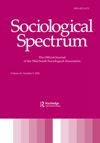从一般应变理论看高中生恃强凌弱的反应
IF 1.1
3区 社会学
Q2 SOCIOLOGY
引用次数: 3
摘要
在《一般应变理论》(General Strain Theory, GST)中,Agnew认为应变反应的负面情绪与反社会行为有关。研究人员发现,商品及服务税可以解释对欺凌的犯罪和自残反应。然而,并不是所有的年轻人都会做出反社会的反应,比如伤害自己或他人。因此,问题仍然存在,青少年对欺凌的反应是反社会的还是亲社会的?为了回答这个问题,本研究考察了基于情境的负面情绪、可替代关系的可用性,以及对身体、语言、关系和网络欺凌的行为反应。本研究综合了社会学、犯罪学、健康学和社会心理学的研究,在高中欺凌受害者的样本中解决了这个问题。这项研究发现,基于欺凌类型的情绪和行为反应存在差异。然而,在欺凌类型中,可选择关系的可用性与亲社会反应的增加有关。本文章由计算机程序翻译,如有差异,请以英文原文为准。
Responses to bullying among high-school students through the lens of general strain theory
Abstract In General Strain Theory (GST), Agnew asserts that negative emotions in response to strains are associated with antisocial behavior. Researchers found GST to explain criminal and self-harm responses to bullying. However, not all youth respond antisocially, such as by harming the self or others. Thus, the question remains, when do youth respond to bullying antisocially versus asocially or prosocially? This study examined situation-based negative emotions, the availability of alternative relationships, and behavioral responses to physical, verbal, relational, and cyber bullying to answer this question. This study integrates research from sociology, criminology, health, and social psychology to address this question among a sample of high-school bully victims. This study found variation in the emotional and behavioral responses based on the type of bullying. However, across bullying types, the availability of alternative relationships was associated with increased prosocial responding.
求助全文
通过发布文献求助,成功后即可免费获取论文全文。
去求助
来源期刊

Sociological Spectrum
SOCIOLOGY-
CiteScore
3.80
自引率
5.60%
发文量
16
期刊介绍:
Sociological Spectrum publishes papers on theoretical, methodological, quantitative and qualitative research, and applied research in areas of sociology, social psychology, anthropology, and political science.
 求助内容:
求助内容: 应助结果提醒方式:
应助结果提醒方式:


